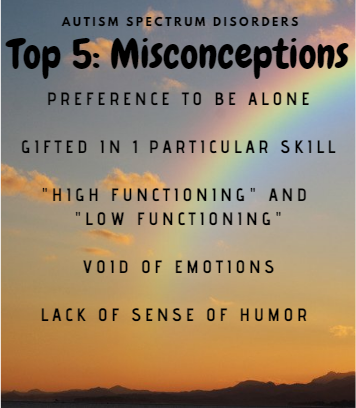Just kidding, there is no possible way I could attempt to explain Autism Spectrum Disorders in one post. But I did make a few lists of 5 that I think can be helpful to people! If you have a “top 5” or an idea for a top 5, post it in the comments and we can add to the post.
First up, my favorite TedTalks about Neurodiversity:
The Autism Experience, Samuel Beldie
The Truth About Growing Up Disabled, Dylan Alcott
Love, No Matter What, Andrew Solomon
Why Everything You Know About Autism is Wrong, Jac den Houting
I Got 99 Problems…Palsy is Just One, Maysoon Zayid
5 Environmental Components
We want to create environments that are “friendly” to people with typical and atypical neurological development. While every individual is unique, some fairly universal components of environment to pay attention to when building environments conducive to people with or without ASD are as follows.
Lighting and Seating
Arrangement of People
Predictable and Consistent Schedule
Language Usage (clear, concise)
Sensory Input (e.g.,. control of sounds)
5 Misconceptions About Autism Spectrum Disorders
No qualifier should be used to describe all individuals in any group of people unless the group is specifically designed around particular qualifiers. Rather than dispelling each of the following generalizations which become misconceptions when used inaccurately, let’s just do this: in life, talk to people before making assumptions. There is way too much variability and nuance involved in human beings as well as in each of the following factors to globally attach them to each other (the humans to the factors). While some of the following may be true for some people with ASD, the same could be said for people not diagnosed with ASD. Depending on who we are describing, the following could be partially true, completely untrue, require further explanation, and so forth. In a nutshell, the following descriptors become misconceptions when used as generalizations.
Preference to be alone
Gifted in one particular skill
“high functioning” and “low functioning”
Void of emotions
Lack of sense of humor
Remember to leave a comment if you have an idea for a top 5 or even if you have a list you’d like to share!
As always, to everyone out there regardless of life circumstances, age, ability, and more -
Take risks, live your life, ask questions, and find your fun!




